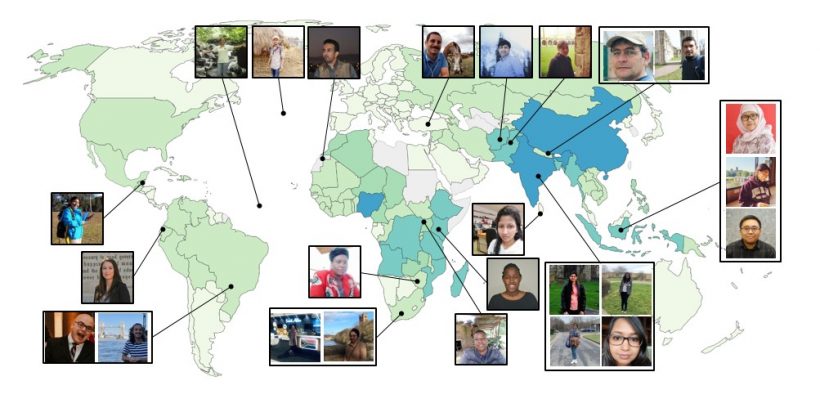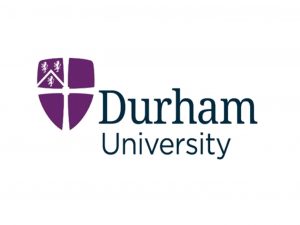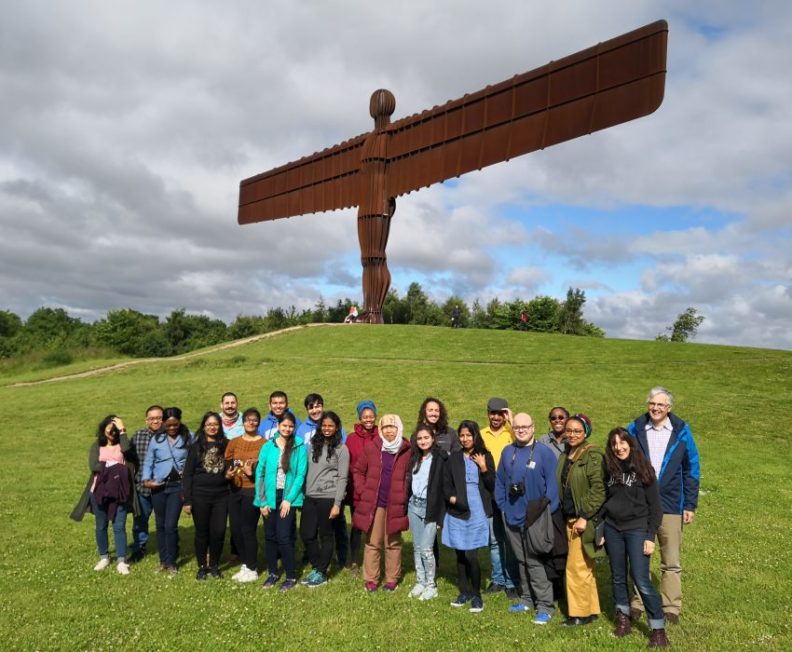Education is a key to successfully implementing the SDGs

Where do we stand as an individual on the SDG 2030 Agenda?
What role are we playing as a developing nation for a sustainable Earth?
As part of GCRF 2019 cohort, all 25 of us are trying to study and present analysis on a problem that is related to the SDGs. The cohort is native to the developing countries that are struggling with the effects of most of the issues that the 2030 Agenda addresses. Within the efforts to achieve this target by the UN generally, it is equally important to know what the governments/officials of the developing countries plan or have achieved in terms of a sustainable planet and what is the impression of SDGs on the local public that is struggling for the basic necessities of life. The exercise included eight of us (as most of the candidates are away for their field works and placements) representing seven developing countries, where we discussed the SDGs relative to our native countries.
Starting from the southern tip of North America, RC takes pride in Belize being multi-cultural with its government focusing in targeting the SDGs and initiatively signing international agreements, commitments to conservation and running awareness programs for the locals. She expressed her concerns with regard to gender-based violence, high crime rate and safety for all communities. Where the government has taken some steps to address these issues, and is keen to pass the Human Rights Bill, there is resistance from some of the religious communities particularly targeting the LGBT community and indigenous communities. The government of Belize is motivated and has every intention to contribute to the SDGs but implementation and realizing the development goals is challenging, as progress is not easily made evenly across race, ethnicity, social status, and gender lines.
Similarly, Ecuador faces issues relating to gender inequality, sexual harassment and unacceptable levels of racism. The indigenous Ecuadoreans are often excluded from the country’s development plans, while the government pushes to approve commercial exploitation of oil and mining, extracted from their territories in the Amazon. With this, the country also faces a financial crisis due to the rapid removal of subsidies, which were offered since 1970. This led to huge fuel prices increase. Despite these issues, MC explained that the government is committed to the SDGs and that the general public have a spiritual relationship with their land that affects them emotionally.
VS shared his deep concerns for Brazil. Between 2003 and 2013 there was much progress in Brazil; including growth in reduced inequality and many people were raised from poverty. However since 2014 the economy in Brazil has decreased, there is a rising unemployment and a political uncertainty. The country is facing many challenges towards the ending of poverty and the promotion of a more prosperous and sustainable Brazil. Health care and medicine in Brazil is accessible and free of cost, but at the same time, funding is being cut for education and the research sector. A lot of people living in remote areas of Brazil struggle for easy access to schools due to lack of basic infrastructure.
From the borders of Europe and Asia, BG told us that he does not see poverty and hunger being an emerging issue for Turkey, comparing the public in groups of “urbaners” who struggle for financial security and employment crises, whereas the “country side people” being more content and living a sustainable lifestyle. He also indicated that the country has subsidized health care and has built several universities over time but this increase has resulted in a decrease in quality of work produced in some instances. He pointed out that Turkey is not ratifying the Paris climate agreement. Sustainable energy sources in Turkey is doubling, but at the same time the revenue generated by coal and fossil industry is increasing every year too, resulting in no gain in Turkey’s role in the climate change struggle.
In contrast with Turkey, Pakistan though making strong international bonds is dealing with immense economic crises. A minority of the budget is spent on health and education, resulting in poor quality of public schools and hospitals. Defense and security being a focus problem, the government and army invest time in dealing with difficult neighbours and maintaining peace beyond borders. The current prime minister has shown his positive intentions towards the changing climate by putting efforts in completing the target of planting a billion trees in the northern areas under the Bonn challenge and making Hunza valley the first plastic free district in Asia. With a low literacy rate and lack of awareness in general public, I believe Pakistan must pace up its walk on a long road leading the SDGs.
Moving towards the land of five main islands that sub comprises of seventeen thousand islands, RA and RC from Indonesia believe that the families who struggle for food and shelter are often not able to observe and act upon other issues of SDG Agenda. Development is not equally invested among the five main islands and some schools and health care institutions are not easily accessible for all islands. The Indonesian government is currently implementing a set of UHC policy reforms that include the integration of remaining government insurance schemes into the JKN, which is designed to make health care available to its entire population. The government has devised a National Action Plan regarding the SDGs and Indonesia is committed to successfully implementing the Sustainable Development Goals, however the country’s success in achieving the goals will depend on focusing on localizing the SDGs at provincial and district levels and inclusion and participation of the different communities and partnerships.
Generally, all of us expressed the lack of work being done on mental health and equal rights for all communities (specifically the LGBT community) where both these issues are considered as a taboo topic to be discussed. There is immense need of awareness and understanding of the SDGs among the general public of the developing countries whose energies are mostly invested in making ends meet. All agreed that a key to successfully implementing the SDGs is education for everyone.
By Anza Shakeel

